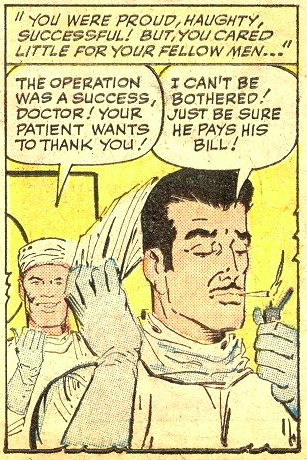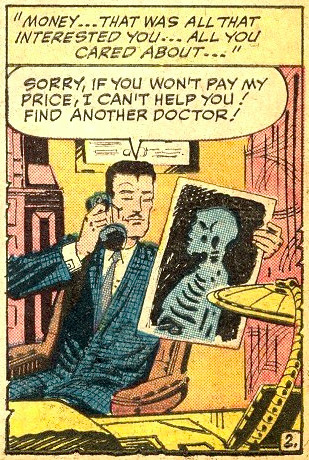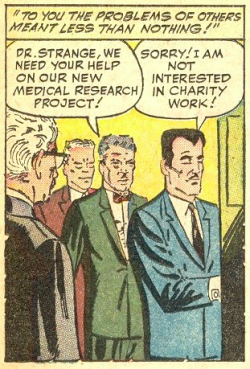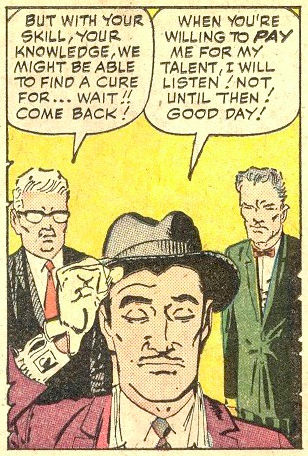Most fun I've had at the movies in a long, long time.
And only 107 minutes! All these trudging three hour epics in theaters these days could learn a thing or two from it...lookin' at you, Girl with the Dragon Tattoo.
In the last stand of sentient beings in the universe two young bloggers took up their last fortification in THE JUNCTION TO NOWHERE.
Saturday, December 24, 2011
Saturday, December 17, 2011
A bad month in comics history.
As with Jerry Robinson, I had a chance to see Mr. Simon at Comic Con, although by then his health was waning considerably. He and Robinson were living legends, two of the last the great Golden Age creators. Soon there will be no one left, and the last vestiges of that amazing period of imaginative realization will be gone forever.
It's been a sad seven days for comics fans, and in general for all lovers of literature and visual art. Rest in peace.
Thursday, December 8, 2011
A Letter to Brain Michael Bendis
Dear Mr. Bendis,
Your new series Ultimate Comics: Spider-Man was one of the most talked-about things going on in comics when it debuted in September. Miles Morales had gotten a lot of media attention due to both his position as the new Spider-Man and his race; he is a character many, many people are following closely. So far, the cover of every issue released (four months worth of comics) has featured Miles in the new Spider-Man costume, which itself has received an enormous amount of attention - it's already a t-shirt. And yet, in the comics themselves, Miles has so far appeared in-costume a total of...zero times. Yep, as of issue #4, he has not even received or made it yet.
It is our humble suggestion, then, that you get Miles Morales in that fucking costume already.
Your notoriously slow - sorry, decompressed - writing style has hemorrhaged - sorry, deterred - many people in the series' short run, but it seems to have settled at a steady readership of about 50,000. Surely Miles finally - sorry, finally - donning the costume, and the quickening in pace that would logically accompany it, would help restore sales to a fraction of the series' debut level. So let's get on with it already, Mr. Bendis. Give the people what they want, what those who still haven't jumped ship are so desperately waiting for. Because if you don't do it soon, there will be no one left to read about it when he does.
At the very least people would no longer be able to accuse Ultimate Comics: Spider-Man as false advertising.
Hugs and kisses,
Everybody
Your new series Ultimate Comics: Spider-Man was one of the most talked-about things going on in comics when it debuted in September. Miles Morales had gotten a lot of media attention due to both his position as the new Spider-Man and his race; he is a character many, many people are following closely. So far, the cover of every issue released (four months worth of comics) has featured Miles in the new Spider-Man costume, which itself has received an enormous amount of attention - it's already a t-shirt. And yet, in the comics themselves, Miles has so far appeared in-costume a total of...zero times. Yep, as of issue #4, he has not even received or made it yet.
It is our humble suggestion, then, that you get Miles Morales in that fucking costume already.
Your notoriously slow - sorry, decompressed - writing style has hemorrhaged - sorry, deterred - many people in the series' short run, but it seems to have settled at a steady readership of about 50,000. Surely Miles finally - sorry, finally - donning the costume, and the quickening in pace that would logically accompany it, would help restore sales to a fraction of the series' debut level. So let's get on with it already, Mr. Bendis. Give the people what they want, what those who still haven't jumped ship are so desperately waiting for. Because if you don't do it soon, there will be no one left to read about it when he does.
At the very least people would no longer be able to accuse Ultimate Comics: Spider-Man as false advertising.
Hugs and kisses,
Everybody
Jerry Robinson Died Today
He was 89 years old. His is the third passing of an industry giant this year, the other two of course being Dwayne McDuffie last February at a tragic 49 and the criminally under-appreciated Gene Colan this past June. Both prooker and I had the honor of meeting Mr. Robinson twice. He was a man of matchless presence, emanating an overwhelming sense of calm and civility - I remember when prooker and I were outside the convention center at Comic Con 2010, and I turned around and recognized the face right next to us as none other but Mr. Robinson's; in that moment, a serene aura enveloped us. It was as if we were in a timeless bubble, the three of us sheltered in the eye of the storm, pure composure amidst a raging chaotic sea of cosplayers. Many who make the pilgrimage describe Comic Con as a magical experience. During that encounter, I saw that magic at work.
A great man whose contributions will never be forgotten. Rest in peace.
A great man whose contributions will never be forgotten. Rest in peace.
Sunday, December 4, 2011
King of Komics, Interlude: Trust Me, I'm a Doctor
So I've been thinking about the last post I wrote, the first part of my big ol' essay on how Jack Kirby is responsible for the way the DC and Marvel Universes turned out -- for the operating principles that guide each of them, the big thematic differences we clearly see when we juxtapose the two. The end of that post - where I sort of threw all these other heroes into the equation - certainly seems rushed, and my desire to finish the fucking thing before 4 am and not have it explode into a 40 page thesis paper could easily be misread as a seeming inability or frustration on my part to soundly fit the bulk of Marvel's characters into my theory of how the MU "works." Recently I finished reading Dr. Atul Gawande's The Checklist Manifesto, which recounts the author's experiences as a surgeon over the course of his innovative, pioneering career. Dr. Gawande peppers the book with little nuggets of wisdom, one of which reminded me of my argument. It applies to Doctor Strange, one of the heroes I rather egregiously glossed over toward the end of my big post. I'll let Gawande help me fill in the missing gaps I was unwilling to properly address:
"The most common obstacle to effective teams, it turns out, is not the occasional fire-breathing, scalpel-flinging, terror-inducing surgeon, though some do exist...No, the more familiar and widely dangerous issue is a kind of silent disengagement, the consequence of specialized technicians sticking narrowly to their domains. 'That's not my problem' is possibly the worst thing people can think...but in medicine, we see it all the time."
Yup, that's crotchety Doc Strange to a T.
Quick back-story dump: Stephen Strange was an enormously talented, world-renowned surgeon whose skill was matched only by his greed, ego and callousness. Imagine Dr. House but even more curmudgeonly and without any redeeming qualities. I mean the guy didn't even have the human decency to treat patients without insurance, I'm pretty sure that's a felony. To him the Hippocratic oath meant nothing; he was in the business of helping people and all that mattered to him was the money and acclaim. Which is not to say he didn't help people - he was the best at what he did (and what he did was very nice!) if you could foot the bill - but the point was...well I'll let the panels speak for themselves:
What kind of doctor smokes outside the operating room?! Inevitably, Strange learns a traumatic lesson in humility - he gets into a car crash that subtly damages the nerves in his hands, meaning he can never pick up the scalpel again. Too proud to accept positions as a consultant or assistant, the good doctor searches all over the world for a way to mend his hands, eventually finding himself at the doorsteps of a mysterious temple in the Far East. From there things go pretty much how you'd expect them to: he becomes a pupil of a wise Oriental mystic known as the Ancient One and reevaluates his life while learning Zen and magic and shit. Or whatever. When he completes his training, he re-enters the business of helping people, but this time he's got the right attitude...and magic powers. So yeah Doctor Strange! Master of the Mystic Arts, Sorcerer Supreme, all that cool stuff! Whooo!
For a quick reminder, the big point I made in my last post was that the Marvel Universe represents not the dichotomy of good vs. evil, but selflessness vs. selfishness; essentially, it's about mankind's struggle against its own proclivity toward inaction. All of the MU's major heroes are proactive figures fighting against indifference, and most of them (Spidey, Strange, et al) were impelled toward do-goodery as repentance for great wrongs their own indifference caused in the past.
So before I leave you here, hopefully having convinced you that I at least know what I'm talking about, let's take another look at that quotation: "The most common obstacle to effective teams, it turns out, is not the occasional fire-breathing, scalpel-flinging, terror-inducing surgeon, though some do exist...No, the more familiar and widely dangerous issue is a kind of silent disengagement, the consequence of specialized technicians sticking narrowly to their domains. 'That's not my problem' is possibly the worst thing people can think...but in medicine, we see it all the time."
Doctor Strange's origin story clearly supports the idea at work in the greater fabric of the Marvel Universe, especially when bearing Gawande's insight in mind. If nothing else, his words should remind us all how relevant a lesson it truly is, and affirm the intrinsic value superhero comics have to offer.
Subscribe to:
Posts (Atom)







